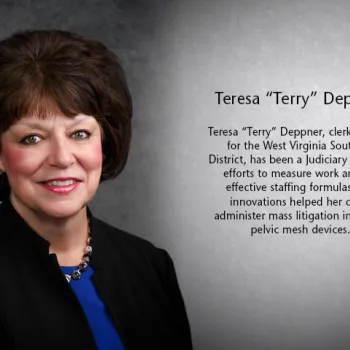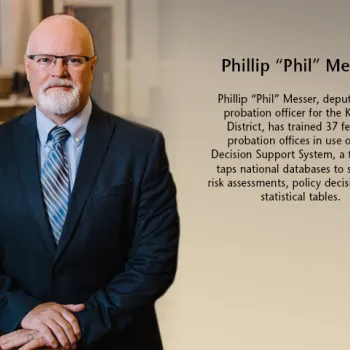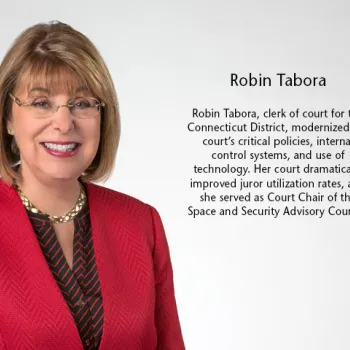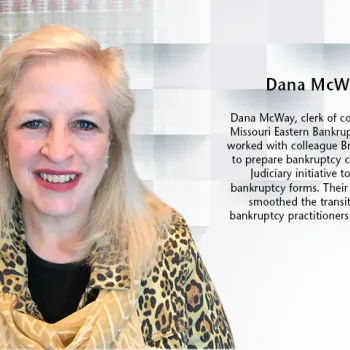Attracting, training, and retaining a skilled and diverse workforce are hallmarks of the federal Judiciary. Critical support systems and innovative practices are vital to the efficient operation and management of the Judiciary.
Work Measurement Formulas
In September 2016, the Judicial Conference approved a recommendation from the Committee on Judicial Resources to update staffing formulas for bankruptcy clerk’s offices, court reporters, pro se law clerks, and death penalty law clerks. The schedule calls for project completion in 2017. The Conference also adopted a recommendation to amend the portion of the current staffing formula for probation offices relating to preparation of guideline presentence reports. The new option provides a balanced approach that can align staffing resources and workload more closely while acknowledging the inability of smaller court districts to achieve the economies of scale available in larger districts. The option does not affect the current aggregate number of full-time equivalent positions assigned to prepare guideline pretrial sentence reports.
Human Resources Management Information System
A major technical upgrade to the Human Resources Management Information System (HRMIS), completed in 2016, improved the performance, security, and user experience of the system. In addition, two pilot projects aimed at making the hiring process more efficient were initiated, one that allows HR staff to better manage background check and investigation requests and another that allows them to create onboarding records in HRMIS that are then shared with other internal systems, eliminating the need for duplicate data entry.
Diversity Outreach
The Judiciary is committed to fair employment practices and a diverse workforce. Since 2010, the Administrative Office (AO) has facilitated local court participation in 117 career fairs and legal recruiting events, resulting in direct contacts with more than 10,000 students. The AO coordinates attendance by judges and court staff at local career fairs, where they can meet one-on-one with diverse pools of potential employees and highlight the Judiciary as a desirable employer.
Another outreach effort is the Summer Judicial Internship Program, which pairs a diverse pool of exceptional students with federal judges. In 2016, over 130 students applied to the program, resulting in 25 students from 15 law schools being placed with 25 federal judges. The AO partnered with district and bankruptcy courts in Alabama, Georgia, Mississippi, and Louisiana on a new program to offer paid and volunteer summer and long-term internships to a diverse group of college and law school students. The first internships are expected to be awarded in 2017.
Training and Development
The AO hosts a variety of programs throughout the year to train and develop court employees across the Judiciary. The programs offer opportunities for employees to deepen their knowledge of their areas of expertise, to expand into new areas, and to work on projects outside their regular responsibilities. In 2016, nearly 70 court and public defender organization employees participated in temporary duty and extended collaboration assignments; 24 AO employees participated in intensive orientations of court operations in two circuits; and the AO sponsored two in-depth knowledge seminars that were made available by video across the Judiciary.
In addition, two people were selected for the annual Director’s Leadership Program, a yearlong residency that offers well-qualified court staff the opportunity to work on national-level projects while developing a greater understanding of national issues and policies. They are:

Amaryllis D. Austin
Amaryllis D. Austin, Location Monitoring Specialist, Eastern District of California Pretrial Services Office, joined the Probation and Pretrial Services Office on a project that examines whether the statutory presumption of pretrial detention results in low- or moderate-risk defendants (as determined by the Pretrial Risk Assessment tool) being detained pending trial. She will lead an effort to collect and analyze detention orders for a group of defendants who were detained. The analysis could yield helpful information on whether the statutory presumption is resulting in low- or moderate-risk defendants being unnecessarily detained.

Zackary M. Lyons
Zackary M. Lyons, Executive Assistant to the Clerk of Court, Northern District of California District Court, joined the AO’s Office of Fair Employment Practices to help manage multiple special projects related to strategic diversity outreach in courts around the country. At the end of the one-year assignment, Lyons will draft a report with recommendations for best practices.
2016 Director’s Awards
The Director’s Awards, given by the Director of the Administrative Office, recognize the outstanding leadership and excellence in court operations of federal court employees nationwide.
Director’s Award for Outstanding Leadership
This award recognizes managerial-level employees who demonstrate exemplary stewardship of court resources, while advancing programs with a Judiciary-wide impact that improved service to the public. The 2016 recipients are:
Elizabeth "Libby" Smith, clerk of court for the Idaho district and bankruptcy courts, achieved significant efficiencies and savings, including over $500,000 in salary requirements through reductions in managerial-level positions. A former chair of the District Clerks Advisory Group, she also led strategic planning initiatives, which culminated in national training programs for court unit executives. Smith’s office provided support to 20 visiting judges in 2015-16, helping the District of Idaho cope with a shortage of Article III judges. She is one of the few clerks in charge of a fully consolidated clerk’s office that serves both the district and bankruptcy courts.
Teresa “Terry” Deppner, clerk of court for the West Virginia Southern District, is a national leader in Judiciary efforts to measure work and set effective staffing formulas. Deppner oversaw innovations that enabled the Southern District of West Virginia to administer 77,000 pending civil cases, many of them associated with multi-district litigation cases. These innovations included evening and weekend staffing to accommodate case filings from coast to coast, as well as executing agreements with other courts for docketing services. From fiscal year 2014 to 2016, Deppner returned a total of $7.5 million in unused staffing allocations to the AO.
Phillip “Phil” Messer, deputy chief probation officer for the Kansas District, helped cut costs and improve supervision outcomes through evidenced-based decisions and practices. Messer trained 37 of the Judiciary’s 94 district probation offices in the use of the Decision Support System, a comprehensive analytical tool that uses national databases to support risk assessments, policy decisions, and the creation of statistical tables. Messer was part of the original instructor group that opened the National Training Academy for probation officers in Charleston, SC, in 2005. As deputy chief, he has educated collateral agencies and treatment providers about the Judiciary’s role in successfully reintegrating offenders into their communities.
Director’s Awards for Excellence in Court Operations
This award recognizes employees who have contributed to excellence in operating with economy and efficiency, in providing innovations that improve service, or in establishing community outreach programs or enhancing the public’s awareness of the federal Judiciary. The 2016 recipients are:
Robin Tabora, clerk of court for the Connecticut District, initiated a broad modernization of the court’s critical policies and internal control systems, and implemented best practices to improve service and increase workforce productivity. Under her stewardship, her court was able to avoid layoffs and furloughs during sequestration, and the court dramatically improved juror utilization rates and implemented a successful public outreach initiative about jury service. She also successfully spearheaded a number of building projects in her district.
Thomas Van Beaver, human resources administrator for the New Hampshire District, conceived, developed, and implemented an interactive web-based application called Leave it Forward eShare (LiFe). This national database enables local court unit leave administrators to better manage the Judiciary’s Voluntary Leave Transfer Program (VLTP), which allows employees to donate unused leave to workers who have exhausted their leave as a result of medical emergencies or traumatic events. This innovation greatly expanded the reach and efficiency of VLTP, which previously had relied on a large volume of emails, as well as local bulletin boards, to communicate leave requests.
Two employees of the Missouri Eastern Bankruptcy Court — Dana McWay, clerk of court, and Brian Wooley, systems administrator — helped bankruptcy courts across the country to prepare for a national initiative to revise bankruptcy forms. Their leadership is credited with minimizing confusion, eliminating duplicated effort, and smoothing the transition to the new forms by bankruptcy practitioners using the Case Management/Electronic Case Files System.
Specifically, McWay and Wooley helped create a central repository of information that all bankruptcy courts could benefit from using. Working with other courts, they compiled a database of new forms in various formats, and programming files that would be required to file and manage the revised forms electronically. The database also stored training materials, detailed testing information, and an online forum for questions and comments from the bankruptcy court community.
Reginald D. Michael, chief probation officer for the Florida Southern District, cut costs while also delivering services more efficiently. From FY 2012 to 2016, he voluntarily reallocated or returned a total of $5.8 million in unused funds either to his district's clerk of court or to the AO. A reduction in leased office space lowered Judiciary rent costs in Michael’s district by about $2.6 million during the same period. His office is a leader in the implementation of evidence-based practices, including the use of specialized caseloads to supervise about 1,000 low-risk offenders with fewer resources, while enabling more intensive supervision and cognitive behavioral instruction to assist higher-risk cases.
Annual Report 2016
- Annual Report 2016
- Funding/Budget
- The Courts and Congress
- The Federal Bench in 2016
- Accountability and Resource Management
- Facilities and Security
- Public Outreach
- Court Operations and Case Management
- Defender Services
- Probation and Pretrial Services
- Human Resources
- Information Systems and Cybersecurity
- Recent and Proposed Amendments to the Federal Rules
- In Profile








